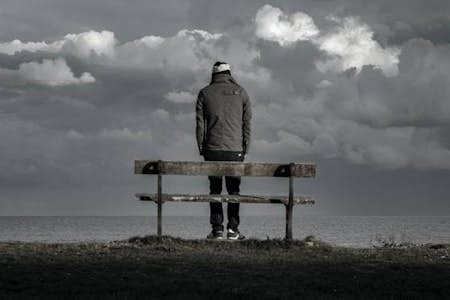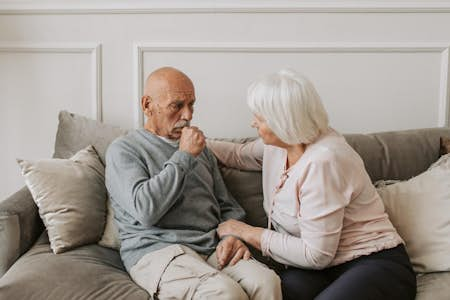We live in a heavily digitised modern world, permanently interconnected via our mobile phones, tablets and computers.
So why do we still often feel so distant and far apart from one another?
Creeping through the cracks of our modern society is a pervasive epidemic that predates the history books but is perhaps more prevalent now more than at any point in human history: loneliness.
Loneliness has a powerful impact on our mental and physical health, reducing our cognitive abilities even whilst we’re young. As we age, the effects of loneliness become more severe, increasing the risk of various diseases and odds of developing dementia by as much as 20%.
Scientists, social workers and campaigners alike have been encouraging us - all of us - to look at loneliness as a public health epidemic.
Here, we’ll be asking and answering, “what does loneliness do to people,” both physically and mentally.
If you're looking for strategies for tackling loneliness, we also have a guide on tackling loneliness here. You can also click through various articles and resources on loneliness presented here by Pension Times.
How common is loneliness?
Loneliness is so common that it has been classed as a public health epidemic by many scientists worldwide.
Research by the British Red Cross found that 1 in 5 people in the UK reports feeling lonely frequently or all the time, whereas 45% of adults report feeling lonely sometimes.
Formerly, loneliness was thought to be worst-suffered by older populations, but a large-scale BBC survey found that 16 to 24-year-olds are becoming the loneliest demographic.
The staggering facts surrounding loneliness don’t end there; you can read our other article 8 shocking statistics about loneliness.
In short, then, loneliness is experienced near-universally.
The irritating irony to loneliness is that if you feel alone, then you are anything but alone.
Loneliest among older people
Loneliness for the over 50s is rising rapidly, and the health consequences of loneliness for older people are often more severe.
Channel 4 News produced this candid, powerful and authentic portrayal of loneliness amongst the elderly back in 2015.
When it was produced, over 1.1 million older people in the UK said that they felt lonely often or all the time.
For many, this was a watershed moment in our collective national awareness of loneliness.
Our contemporary awareness of how prevalent loneliness has catalysed a burgeoning body of research. We now understand what loneliness does to people and what we can do to stop it.
Our loneliness epidemic
I call it ‘our loneliness epidemic’ because that’s what it has become.
Our loneliness epidemic presents a peculiar situation for a social species such as humanity.
Partially, this is why loneliness is so damaging - we’ve evolved as a social species for over 200,000 years.
To understand the roots of loneliness, you have to go back to the very start.
Consider how lonely life would have been as one of the first humans. You have no mutual language to communicate with others, no developed understanding of where you are or why you are even here.
This quickly changed, and prehistoric humans rapidly established groups and collective communities.
The social bonds that formed between prehistoric humans ensured their survival. Anthropologists believe that teamwork and collaboration developed partly to help us survive and because we found social life fulfilling, it improved our lives.
Our gregarious nature is hardwired into our DNA. We’ve thrived off it for countless generations. It’s spurred us on, onwards and upwards, towards the developed and socially connected society most of us enjoy today.
The device you’re reading this article on, the keyboard I’m using to type it on...These things exist, in part, because of humanity's enduring and tremendous ability to collaborate and cooperate in groups and teams.
In light of this, why is it that loneliness is rife and rising today? Why have we developed loneliness?
Modern loneliness
Loneliness has existed for as long as humans have walked the earth, but historian Fay Bound Alberti in A Biography of Loneliness: The History of an Emotion argues that loneliness in the type of chronic form we experience today probably didn’t arise until the 19th century.
Before that, humans simply had no choice but to work together in groups; it was necessary for survival. Humans lived and worked together almost constantly. Even in Victorian Britain, vast swathes of the working class would collectively enter their local ‘doss house,’ which would house hundreds or thousands of individuals at any one time.
In such conditions, the concept of loneliness probably wouldn’t occur to you. If anything, you’d crave some independence!
And that’s more-or-less where we are today. We’ve spent so many years fighting for our independence in various forms and battling for the right to live our life how we want to.
Amongst other great achievements, this struggle for personal independence has also forced people apart physically.
The sociologist Eric Klinenberg in Going Solo: The Extraordinary Rise and Surprising Appeal of Living Alone summed this up well;
“For the first time in human history, great numbers of people—at all ages, in all places, of every political persuasion—have begun settling down as singletons.”
For all gains and successes in personal independence, we have now inherited an increasingly individualistic social world.
This combines with many other factors; technology, the decrease in communal working environments, the rise of urbanisation, the increase in divorce rates and decline in marriage or other types of civil union.
Whilst this can in part be heralded as a triumph of our fierce drive for independence, it has ushered forth unforeseen side effects - loneliness is one of those side effects.
Loneliness and social media
Any analysis of why humans are lonely would be incomplete without discussing social media.
Our digitised world has enabled humans to talk without speaking. Talking on the phone is one thing; at least you can hear someone’s voice. But now, messaging is the number one form of communication worldwide, with billions of messages sent each day.
The development of social media was inevitable. In a sense, social media is a conversation without genuine human interaction, and thus, it can be so hard to know what is authentic and what isn’t.
Studies have linked social media to a wide range of adverse psychological consequences. For example, social media induces feelings of FOMO - fear of missing out - when we scroll through the lavish lives of celebrities that dominate the newsfeed.
The connection between social media and loneliness is also well-established, with psychologists arguing that it makes us feel like ‘everything good that happens is happening somewhere else.’
The screens of our phones and computers are absorbing us away from forms of physical interaction.
Loneliness in the coronavirus pandemic
Unsurprisingly, the coronavirus pandemic has intensified the feeling of loneliness for many worldwide.
In the US, 65% of young adults said they felt more lonely during lockdown. A UK survey suggested that 1 in 4 UK adults felt lonely during the first lockdown.
Loneliness commonly appears alongside mental health issues, including increased anxiety and depression.
The health effects of loneliness
Loneliness and its various mental and physical impacts have been examined in great detail over the past decade or so.
The late Dr Cacioppo, PhD, former director of the Center for Cognitive and Social Neuroscience at the University of Chicago, was one of the pioneers of the health consequences of loneliness.
His wife, Stephanie Cacioppo, PhD, continues much of his work. She told the National Institute of Aging:
“The misery and suffering caused by chronic loneliness are very real and warrant attention."
“As a social species, we are accountable to help our lonely children, parents, neighbors, and even strangers in the same way we would treat ourselves. Treating loneliness is our collective responsibility.”
The physical impact of loneliness
Loneliness was once thought of purely as a problematic mood or emotion, but recent research has uncovered that it has a profound effect on our bodies too.
Loneliness raises our stress levels by increasing the concentration of cortisol in our blood. This leads to increased inflammation throughout our bodies, raising our blood pressure and increasing the risk of cardiovascular disease.
Loneliness increases our risk of:
- Type 2 diabetes
- Heart disease
- High blood pressure
- Alzheimer’s disease and dementia
Steve Cole, PhD, director of the Social Genomics Core Laboratory at the University of California, told the National Institute of Aging;
“The biology of loneliness can accelerate the buildup of plaque in arteries, help cancer cells grow and spread, and promote inflammation in the brain leading to Alzheimer’s disease. Loneliness promotes several different types of wear and tear on the body.”
Several scientific studies have also linked loneliness to higher mortality amongst the elderly. However, the effects are powerful enough to harm younger people, too, with some studies highlighting how loneliness as a teen can increase the risk of mental health problems as an adult.
Moreover, research has shown that socialising has the opposite effect to loneliness - it can actually reduce disease incidence. Studies have shown that older people who regularly socialise with others can live longer lives.
This shows that tackling loneliness has two main parts, ending social isolation and increasing socialisation.
The mental impact of loneliness
Our instinct may be to approach loneliness as an emotion - a mental state.
The charity Mind outlines how loneliness itself is not a mental disorder or problem in itself, but that it can easily manifest into depression and anxiety. This goes some way in explaining how social isolation and depression or anxiety were so strongly linked throughout the coronavirus pandemic.
The link between loneliness, anxiety and depression can cause a self-perpetuating cycle. Lonely people feel less able to socialise because of social anxiety or depression, making them more lonely, thus fuelling the cycle.
Depression and anxiety caused by loneliness can also halt our desire to exercise and eat properly and make us less likely to seek help from others.
Loneliness can increase our risk of:
- Depression
- Anxiety
- Insomnia and sleep disorders
- Other mental health problems
Again, the mental health impacts of loneliness are not confined to one demographic or age group; they are near-universally experienced.
However, the increased vulnerability of the over-70s can make them more susceptible to the health consequences of loneliness.
What does loneliness do to people?
If you’re reading this as a lonely person then please realise you are never alone in your feelings of loneliness.
You, I, and other readers have likely all felt lonely at points in our life. Most of us can connect to the feeling of loneliness on some level.
Holistic life coach Dolores Andrew agreed, telling Health Times: "From CEOs to single parents, loneliness doesn’t discriminate. It arrives like a thief in the night and can steal our sense of belonging and purpose.
"Loneliness can crush our dreams and extinguish our inner light. While many of us suffer from temporary loneliness at some stage in our life, chronic loneliness sets in when the gap between what we need and what we have is too big.
"Loneliness stems from a sense of lack. Lack of connection and a feeling of being unable to move beyond it. However, the longer loneliness is left without being tended to, the wider the gap becomes.
"The antidote to loneliness is connection. Deep connection that offers a listening ear and holds space without judgement. Connection bridges the gap between despair and hope and brings dignity back to those who suffer.
"Grand gestures aren’t needed, sometimes a simple smile or a kind word can open the door to a sense that maybe, just maybe there’s light at the end of the tunnel."
Loneliness is not a sentence for life; we are not committed to it forever.
With consideration, awareness and action, we can move forward and end loneliness for ourselves and others.






